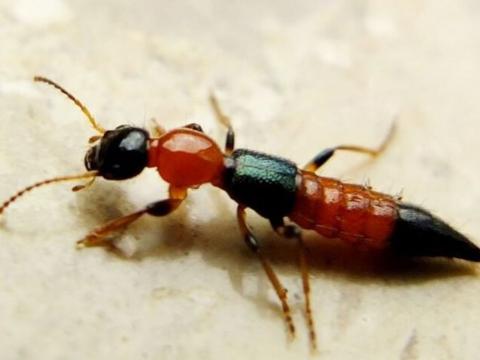By Mohamed Ayoub Conteh
People across the country have expressed concern over the emergence of swarms of beetles known as the Nairobi Fly.
The insects, which are commonly called ‘’champion’’ here in Sierra Leone, have reportedly invaded homes and caused discomfort to many people. They carry a chemical called pederin and when slapped on someone’s skin could release corrosive chemical. Acidic in nature, the chemical causes a burning sensation that leaves the affected part of the human body with blisters.
Ministry of Health officials say the beetles would not be able to survive when the place is hotter as they would dehydrate and die. The beetles live in moist habitats and are often beneficial to agriculture because they will eat crop pests. Adults are attracted to incandescent and fluorescent lights and as a result, they come in contact with humans.
Andrew Charles, an auto mechanic at Charles Street, who is a victim of Champion, explained that he was asleep when the insect walked on his skin very close to the eye.
“I have to use sunglasses because of the injuries it left on my eye. I didn’t notice it until morning when I started felling pains.”
According to Charles he lives in the hills at Dwarzack Farm with lots of trees in the surrounding.
Another victim of Champion, Ibrahim Sesay, told Politico that the insects have invaded his household, leaving everyone affected.
“All my kids have been affected by this thing. In morning again, I saw wounds on my son’s neck caused by the same champion after we have just treated the first infection,” he said.
The beetles neither sting nor bite, but carry the potent pederin toxin that causes blistering and paederus dermatitis. The toxin is released when the beetle is crushed against the skin, often at night, when sleepers unintentionally try to brush off the insect from their faces. The skin irritation only occurs when you crush the insect against your skin. Most of the time, people do it unknowingly, which is why the joints, neck and face are the most affected.
The Ministry of Health has been monitoring development around the activities of the insect and the reaction of the public.
Harold Thomas, Programme Manager of Health Education in the Ministry of Health and Sanitation (MoHS), said Champion is not a new phenomenon and that the public can avoid it if they follow the right advice.
“These are insects that are sensitive to dehydration and they do not bite. People should not kill them while on their skin, which will cause redness or skin irritation because of its fluid which is corrosive. Sometimes because of the irritation, other bacteria may cause inflammation,” Thomas told Politico.
He further advised that people should not sleep under bright light and that in the event the insect is prevalent in an area, people should ensure they cover their lower and upper extremities by wearing long trousers and clothes and cover their hands.
According to him, this is not the first time Sierra Leone is experiencing this insect. He said it appears on a seasonal basis, noting that the only way to avoid it is to ensure personal and environmental hygiene.
“People should ensure that they keep their environment clean. Wash the areas where the fluids are on properly, with soap and water,” he said.
Copyright © 2020 Politico Online








